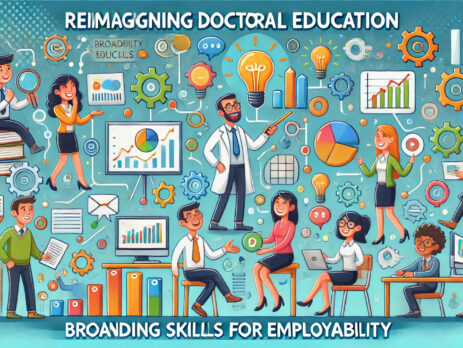The CHAMELEONS project (Championing a Multi-sectoral Education and Learning Experience to Open New pathways for doctoral Students) aims to redesign doctoral education to improve employability in academic and non-academic settings. By co-designing modules with stakeholders from academia, industry, and patient organizations, the project developed interdisciplinary and intersectoral curricula that focus on networking, user-centered research design, and career planning. These modules equip graduates with versatile skills to meet future societal and professional challenges.
What was the context of our study?
Most doctoral graduates do not remain in academia, with only 10–15% securing long-term academic careers. This highlights the need for doctoral programs to prepare graduates for careers in diverse sectors, including industry, government, and non-profits. However, traditional PhD curricula often lack the flexibility and interdisciplinary focus required to meet this demand. The CHAMELEONS project addresses this gap by developing educational interventions that enhance the adaptability and employability of PhD students.
What did we do?
Using a participatory “World Café” methodology, we gathered input from stakeholders including academics, industry professionals, patient representatives, recent graduates, and doctoral students. Participants identified key skills and strategies for improving doctoral training. These insights informed the development of three bespoke modules:
- Forging Relationships: Building and sustaining professional networks.
- Managing the Project: Staying on track with research while planning for the future.
- Starting Your Career: Preparing for diverse career pathways post-PhD.
The first module was piloted online due to COVID-19 restrictions and included interactive sessions, reflective exercises, and networking opportunities.
What did we find?
The modules focused on enhancing communication, emotional intelligence, and interdisciplinary collaboration. Feedback from participants emphasized the value of networking opportunities and the practical relevance of the training. Participants noted improvements in their ability to market their skills and engage with stakeholders across sectors. Challenges included adapting interactive methods to virtual settings and addressing the varying needs of participants from different disciplines.
Why is this important?
Doctoral education must evolve to prepare graduates for diverse career opportunities beyond academia. By incorporating interdisciplinary and intersectoral approaches, the CHAMELEONS project provides a model for equipping PhD students with the skills needed to navigate complex, rapidly changing professional landscapes. These efforts also promote collaboration across sectors, enabling graduates to contribute to solving societal challenges.
Reference
Cusack T, Mountford N, Isomursu M, Giunti G, Filos D, Chouvarda I. Interdisciplinary and Intersectoral Doctoral Education Designed to Improve Graduate Employability. Education and New Developments. 2021. https://doi.org/10.36315/2021end136

